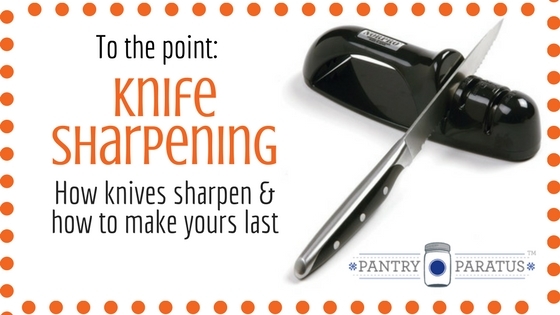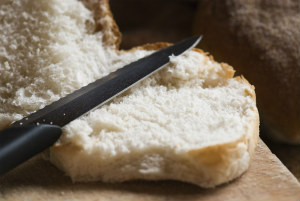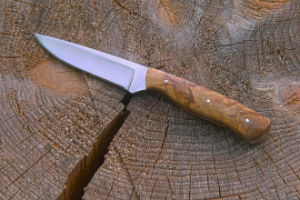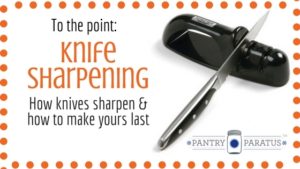
Knife Sharpening
& How to Make Your Knives Last
I am frugal, and I cannot afford to replace the knives we have  when they start to go dull. I am also clumsy and I run a much greater risk of losing an appendage if my knives are dull. It is true that sharp knives are safer than dull ones.
when they start to go dull. I am also clumsy and I run a much greater risk of losing an appendage if my knives are dull. It is true that sharp knives are safer than dull ones.
Every knife dulls. It does not matter what they say about it; some will keep the original edge longer than others, but the fact remains that every knife dulls.
Quality knives do not wear away the blade; the blade will actually begin to fold over onto itself. Less quality, sometimes the microscopic pieces of the knife actually break off! Generally it is better to sharpen your knives at home because many professional sharpeners use equipment that overheats the knife, which can cause metal breakage. This breakage is too small for you to actually see, but it occurs just the same.
Sharpening Steel & Sharpening Stones

Our set of knives came with what is known as a “sharpening steel”. It turns out that this is controversial. All that I know is that it wasn’t all that effective. It unfolds the metal. Since the folding of the metal is what dulls a knife, isn’t unfolding the metal a good idea?
That metal has been weakened considerably and the next time you use the knife, it will simply re-fold again. Eventually, the metal with break off, just like anything that has been perforated and then folded time and again. True sharpening will remove the old worn edge to create a fresh, sharp edge. This way you won’t have the concern of microscopic metal knife shards landing in your food.
A non-electric method is the old-fashioned sharpening stone, and it is excellent for long term self-reliance. However, you have to be a professional to get true symmetry on your knife if using a stone. A non-electric knife sharpener should automatically have obvious cutting guides within it that will guarantee a perfectly symmetrical knife every time. Your knife must have that perfection or one side of the knife will fold much more quickly.
Cutting Boards Matter
Your cutting board has a lot to do with the longevity of your blades; if your board is too hard, such as many synthetic cutting boards, your knives will not wear well. Wood is softer and “gives” to the knife. Many people go with the aesthetics on this one—we don’t want our cutting boards so scarred, and sometimes choose the synthetics to avoid that very quality.
Your knives prefer polyethylene, polypropylene, wood and other soft materials. If you are worried about the sanitation of those cut marks, rub your board down with sea salt or use an essential oil known for its’ anti-bacterial and antimicrobial properties; I like to use oregano essential oil for this purpose. It will kill anything!
How to Wash Knives
 Wash your knives by hand. I know this has been a point of family contention—to use the dishwasher or not—but it is dangerous for the tots yay-high and for the unsuspecting dish-un-loader (is that a real word?). But it goes beyond safety. The force of the water can dull the knives and can knock them against other dishes and the racks. Hard water and chemicals can leave spot stains that hand washing won’t.
Wash your knives by hand. I know this has been a point of family contention—to use the dishwasher or not—but it is dangerous for the tots yay-high and for the unsuspecting dish-un-loader (is that a real word?). But it goes beyond safety. The force of the water can dull the knives and can knock them against other dishes and the racks. Hard water and chemicals can leave spot stains that hand washing won’t.
Basically, the point is that you do not simply want to refold the knife but reform it. The successful ancient methods of this require a great deal of expertise. The good news is that commercially available knife sharpeners, both electric and non-electric, have come a very far way and will ultimately be cost-effective for the homemaker. It’s much cheaper to maintain the knives you have than to purchase new ones every few years. Consider a knife sharpener a necessary kitchen utensil.
We don’t sell knives but we’ll tell you our personal preference—Buck Knives.
Support Pantry Paratus by shopping our store:

Photo Credits:

Thank you very much for these knife sharpening tips.
I learn something new everyday, from blogs such as yours and others, so THANK YOU!
Joe
Great tips, thanks! I never put my good knives in the dishwasher, I didn’t know why I shouldn’t though until I read this!
Eeek, I am really overdue to sharpen my knives… I never have, and they are definitely pretty dull. Thanks for this timely info!
oooo! I definitely could use this info! I am not the best at keeping my knives in good shape!
What is a “sharpening steel?” We have this rough stick like sharpener that came with out Cuisinard knife set. So, is this what you speak of? I may need to get a small sharpener.
Marjie, yes, that’s a “sharpening steel.” They are usually metal and have a handle. They are a long “pole” and you are supposed to scrape the edges of the knife against it. It works temporarily, but is not good for the longevity of your knives. A pro can do it effectively without destroying the knife, but the rest of us are better off with a real sharpener that holds the knife at a firmer angle and sharpens both sides simultaneously.
Thanks for the post! I’m in a search for knife sharpener so it helped me a lot!
Very helpful post for one housewife. Maybe my wife will like it 🙂
Thank you so much for this article. The knife is most important tools of our life. For the sharpest knife, you need the best knife sharpener.